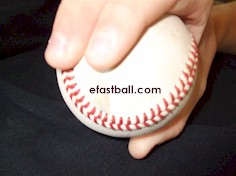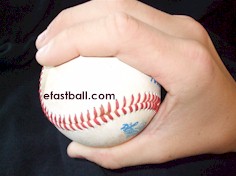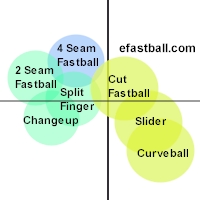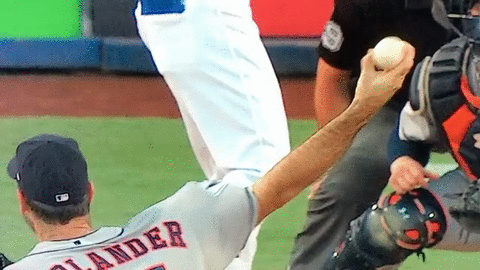How to Grip a Slider



Slider

Right Handed Pitcher

(not supinated)
- 10/7/2020 Corrected pronation/supination discussion. Added Pronation demo gif.
- 5/2008 - Initial page
AKA
This grip is a type of breaking pitch and is only called a slider.Position the Ball
2 seam fastball direction Turn the ball where the seams run the direction of your fingers and the horseshoe (the "U") points away from your palm.Position your fingers
Place your first two fingers (index and middle fingers) next to the right seam.Your ring finger should rest on the side of the ball.
Position your thumb
Place your thumb directly under the ball on the smooth part of the baseball (no seam).Exert Pressure
Squeeze the ball with your thumb and middle finger.Delivery and Release
Push your middle finger toward the batter. Your hand will pronate just like a fastball (thumb down, inward, clockwise LH, counterclockwise RH), but the index finger is on the right half of the ball, so the ball rotates in the opposite direction from a fastball.Compared to other grips
The ball is gripped like a cutter, but the hand is positioned just to the right of center. The speed is slower than a fastball, but slightly faster than a curveball.Sliders move both down and sideways, but not as much as a curveball.
What the hitter sees
This ball is clearly spinning.The seams (and the entire ball) appear as a one inch red circle. If its thrown with a four seam grip, the seams appear as a pink dot.
Alternate grip
Try a four seam fastball grip (cross seams), using the same wrist angle. The seams look different to the hitter and it may move differently.When to throw
This is a very common pitch thrown in baseball. Alternate with fastballs to confuse the hitter.What it does (movement)
The ball will move down and to the left for a right handed pitcher. For a left hand pitcher, it moves down and to the right.The ball creates a tight spin and rotates sideways as viewed by the hitter.
Reaction Time
The hitter has roughly 0.45 to 0.50 seconds to hit this pitch.Typical Speed
This pitch is roughly 5-10 mph slower than a fastball, 5 mph faster than a changeup and 5-10 mph faster than a curve ball.| 10 and under | 35-45 mph |
| 11-12 | 40-55 mph |
| 13-14 | 50-65 mph |
| High School | 65-75 mph |
| College/ Pro | 70-85 mph |
The average speed of all sliders in the majors is 84 mph.
The ball will typically slow down 8-10 mph by the time it reaches the front of the plate. (Note that your home radar gun may stop reading well before the ball reaches the plate because the hitter is in the way.)
